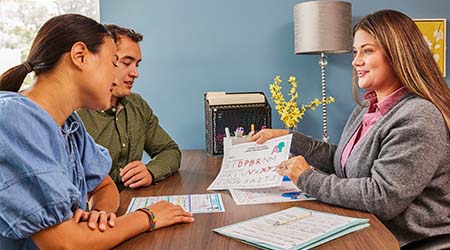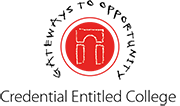Early Childhood Education (ECE)
Bachelor's Degree
Next program start date
April 06, 2026
Finish in as few as
18 months1Learning includes
- Online
- Campus Support and Resources
- Empowered Learning®
April 06, 2026
Whether you're looking to advance your career in a childcare center, lead your own program or become a program director, this non-licensure Bachelor of Science degree in Early Childhood Education will help you further develop your leadership and administration skills.2 Finish this ECE degree in as few as 18 months with a combination of online coursework and self-directed assessments.1 These $149 online assessments let you prove that you already have the knowledge for a particular course and don't need to take it. Online Empowered Learning® courses allow you to learn by doing real-world projects, manage your pace and stay connected with faculty and peers.
Our ECE programs do not prepare students for licensed teaching positions in any public school setting, but students will have the opportunity to help shape the futures of young children from birth to age six in a childcare and non-public school setting or leadership role.
Take me to:
Our non-licensure Early Childhood Education courses give you the advanced knowledge and skills you need to lead the way in ethics and professionalism in early childhood education, as well as create a positive and thriving learning environment for children and their families.2
Our ECE degree graduates feel confident not only advancing their education with an Early Childhood Education Bachelor's degree online, but being a leader in the field. No matter what role they pursue, they can contribute to diverse teams and create positive experiences for children and families.
An Early Childhood Education Bachelor's degree online from Rasmussen University can help you pursue a non-licensure career as a teacher's assistant, early childhood special education assistant, head start teacher or early childhood education teacher in a private childcare setting.
To develop your skills in a particular area of interest, you can choose between two specializations. The ECE Leadership specialization combines ECE principles with administration, management, ethics and communication. The Child Development specialization can help you understand more about early intervention, advanced principles relating to gender and the importance of partnering with parents and other caregivers. Through career-focused learning and real-world assessments, you can promote the healthy development of young children, early childhood ethics and positive leadership in your organization.
ECE Leadership Specialization
Employ the principles of ethics and leadership in early childhood education in order to successfully run your program, interact with parents and advocate for your students.
ECE Leadership Specialization
Perform best practices in formal and informal communication with children, families and professionals. Build community in diverse settings and for various stakeholders.
Child Development Specialization
Utilize developmentally appropriate practices to support children at the critical stages of development of understanding their growth in cognitive, language and social-emotional domains.
Child Development Specialization
Identify risks and challenges to the health, safety and physical development of children. Learn how to respond with intervention strategies, and identify possible protective factors and strategies to be used in prevention.
Both Specializations
You’ll also develop the soft skills you will transfer into your role. Core courses develop your skills in critical thinking, communication, digital fluency, information literacy, and ethics and professional responsibility. Specifically, you'll develop your digital fluency as you apply technological tools and methods to share, educate, communicate, advocate and collaborate with colleagues, families and children in developmentally appropriate ECE settings. Further your diversity, equity and inclusion skills as you investigate cross-cultural and anti-bias practices to be able to act in response to unfairness, eliminate barriers, collaborate as a team and ensure that all children and families are supported. Learn more about transferable skills.

Studies how to support professionalism of the early childhood field and focuses on practices that an ECE professional would engage in to increase their ability provide high quality services. Prepares students to locate and use resources to reach their professional goals, as well as to be an advocate for high quality early childhood education.
Examines best practices in formal and informal communication with children, families and professionals. Explores how to build community in diverse settings and for various stakeholders. Create and analyze effective and ineffective methods of communication within a developmentally and culturally appropriate context.
Advanced study in the theory and principles of child development. Evaluates which current educational practices are developmentally appropriate and will challenge students to examine their own perspectives on how children learn. Focuses on the primary years of development through in-depth exploration of gender roles, socialization and cultural perspectives.
23 Courses to Complete
90 Credit Hours
Discover Thuba's incredible journey from homelessness to an Early Childhood Education degree and successful children's book. Through the support of her family and Rasmussen's expert resources, Thuba not only found her calling in ECE, but answered the call with determination.
"When I stepped into a classroom for the first time with an instructor, and they saw me working with young children and interacting with their parents, I got to hear the validation come directly from the instructor saying, 'Wow, you are a really great teacher, and the way you're interacting with those children is going to change their lives.'"
Thuba Nguyen:
My name is Thuba Nguyen. I have two degrees in early childhood education. One is a specialization in special needs, and I also have a second degree in Early Childhood Education in Leadership.
And before coming to Rasmussen University, I grew up in a very nuclear family. Leaving the home for the first time and being in a new state with new people and not having that support system at that time was extremely lonely and sad.
I was facing being unhoused. I actually was living in silence of the shame, experiencing this homelessness. So, I actually hid this really traumatic experience from them.
Enrolling at Rasmussen University was essentially a handshake to a lifeline, a lifeline to a career, a lifeline to stability, and a lifeline for a future that I could build for myself.
Dr. Mary Muhs:
My name is Dr. Mary Muhs, and I am the Dean for the School of Education Early Childhood Education Program at Rasmussen University. Thuba was a fabulous student. She was engaged, she was inspiring, and you could tell that there was an inspiration driving her to be a good student.
Thuba:
Rasmussen University provided a lot of support in a myriad of ways. Being able to contact instructors and staff outside of office hours, being able to have someone to speak to when there is a question in hand and not ever feeling afraid to ask questions.
Dr. Muhs:
It's important to us to keep that internal motivation moving forward, seeing that goal of graduation ahead of them.
Thuba:
My children's book, "My Daddy Tells Me," really came after the murder of George Floyd and again, where I was challenged to reflect on my racial identification and really live in the fact that being Vietnamese and black does come with responsibility. And after his murder, I had to reflect, have I been walking in one identity and ignoring the other?
Speaker 3:
Thuba's book depicts a positive father-daughter relationship and the story of a family coming to America from Vietnam.
Speaker 4:
Thuba is also an incredible leader. I would love to more than anything, to see Thuba run for office. I would love to see Thuba in Congress. I would love to see Thuba in the Senate, but I would love to see her in a position where she is able to create the laws to help her community.
Thuba:
What would I want to tell my parents? This immigrant daughter that you created has carried the weight of our ancestors into the future. And we are going to heal, and we are going to grow, and we're continuing to be resilient.
And as your immigrant daughter, I am going to continue to inspire other children, other immigrant daughters, to live up to their dreams and reward their parents'. Sacrifice with opportunity.
Are you ready? means to me, are you ready to give yourself the opportunity to succeed?
(upbeat music)
While we aim to reduce your tuition through our own scholarships, military tuition grants, credit transfer policies, and other ways to help you save on your education—we encourage you to seek outside scholarships as well.
You can also receive course waivers if you have earned specific professional credentials:
Florida Child Care Professionals Credential (FCCPC)
Florida Early Childhood Professional Credential (ECPC)
Florida Child Care Apprenticeship Credential (CCAC)
Wisconsin Infant and Toddler Credential
Wisconsin Preschool Credential
Wisconsin Administration Credential
Wisconsin Leadership Credential
AIM4Excellence Director Credential
CDA Credential awarded by the Council for Professional Recognition
For more information, please view the School of Education Waivers from the course waiver section in the course catalog.
The Gateways Scholarship Program will pay a portion of tuition for eligible professionals working in early care and education or school-age programs who want to earn college credit, credentials or degrees.
As an entitled institution, Rasmussen University has aligned coursework to the IL Gateways Credentials. More information on the IL Gateways Credentials can be found here.
To be considered for admission, students must hold a conferred Associate’s degree from an accredited institution as recognized by the Department of Education, or students must have successfully completed 60 quarter or 40 semester credits with a grade of C or higher.
We believe in giving credit where it’s due. You can get an estimate of your transfer credits without an official transcript in one business day (on average). Talk to an admissions representative today, or explore our Transfer Policy page for our seamless credit policies designed to maximize credits, potentially save money and expedite graduation.
Higher education should be a manageable investment. Talk to an admissions representative and learn how these programs can make it more affordable with self-directed assessments, credit for prior learning, grants, scholarship opportunities, corporate grants and military grants for those who qualify.
At Rasmussen University, we want our courses to be available on your schedule, not the other way around. Select programs are available for enrollment through a specific campus and nationally online, but students complete the courses online and are able to utilize online and on-campus support and resources. See below to find out where you can find an online Early Childhood Education program near you.